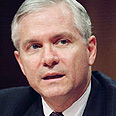
Gates does not rule out nuclear attack on Israel
US defense secretary-designate, testifying at his Senate Foreign Relations Committee confirmation hearing, says he cannot guarantee that if Iran possesses nuclear weapons it will not use them to put Ahmadinejad's threats into action and wipe Israel off map. However, he says US military attack against Tehran would be 'absolute last resort'
WASHINGTON – US Defense Secretary-designate Robert Gates provided Tuesday a gloomy prediction regarding the future of the Middle East.
During his testimony at his Senate Foreign Relations Committee confirmation hearing to replace Donald H. Rumsfeld, Gates was asked about Iran's nuclear program and President Ahamdinejad's threats to wipe Israel off the map.
Gates replied that the Iranian president's threats were serious, but that there were greater forces in Iran than Ahmadinejad who are interested in nuclear ability as a power of deterrence against nuclear countries surrounding them – Pakistan in the east, Russia in the north, Israel in the west and the United States in the Persian Gulf.
The senators asked Gates whether he could guarantee that if Iran possesses nuclear weapons it would not put its threats against Israel into action.
Gates answered that he did not believe anyone could guarantee such a thing.

Gates during hearing (Photo: AP)
During the hearing, however, Gates stated that he would not recommend to the president to attack Iran, but only as an "absolute last resort" and if crucial American interests were being threatened.
He estimated that an American military operation against Iran could lead to chemical and biological terror attacks.
"I think that we have seen, in Iraq, that once war is unleashed, it becomes unpredictable," he said, adding that the consequences of a military confrontation with Iran could be dramatic.
'Wave of anti-Americanism in Middle East'
He added that while Iran cannot directly attack the Americans, it had the ability to close the Persian Gulf for oil exports, to launch a terror campaign in the Middle East and Europe and even in the US. It's realistic, he said.
An American attack in Iran, Gates said, would not help the US in Iraq but would rather damage its interests there. The Iranians, he said, could supply terror groups with weapons for mass destruction, mainly chemical and biological.
He added that Tehran also had the ability to operate Hizbullah and undermine the situation in Lebanon.
As for Syria, Gates said a US attack on that country would unleash a wave of anti-Americanism in the Middle East.
It would have "dramatic consequences for us in Middle East," Gates said. "It would give rise to greater anti-Americanism than we have seen to date. It would immediately complicate our relations with every country in the region."
'Forces should be left in Iraq'
Gates was chosen by US President George W. Bush to replace Donald Rumsfeld following the latter's resignation, and many in the US hope that he will be the person to bring American soldiers back from Iraq.
He admitted that in the current situation, the US was not winning the war in Iraq, but made it clear that it was not fleeing Iraq and would withdraw in an organized manner after the Iraqi government and its security forces are able to control the situation and defend themselves.
The developments in Iraq in the next two years will influence the future of the entire Middle East, he said, adding that a strategy must be developed which will not leave Iraq in chaos and will give the region hope.
If Iraq is not stabilized in a year or two, the entire Middle East will be on fire, he said.
He also estimated that even if there is a significant withdrawal of forces from Iraq in the future, American forces will remain in the country for many years to provide support for the Iraqi army.
AP contributed to the report










